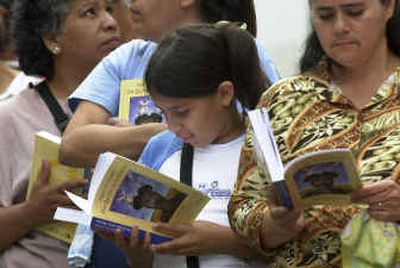Free books and lofty ideals

CARACAS, Venezuela – President Hugo Chavez says “Don Quixote” is a must-read for Venezuelans – and his government has printed 1 million free copies to mark the 400th anniversary of the classic tale of the knight who dared to dream.
Thousands of Venezuelans flocked to public squares across the country Saturday to line up for abridged copies of Miguel de Cervantes Saavedra’s novel, the book that produced the adjective “quixotic” – or hopelessly idealistic. A line near the Plaza Bolivar in downtown Caracas snaked for several blocks around Congress and the plaza, which honors Venezuela’s 19th-century independence hero Simon Bolivar.
“Don’t be left without your Quixote!” Chavez said earlier this week. “We are all going read Quixote to feed our spirit with this fighter who came out to get rid of injustice and fix the world.”
“To some degree, we are followers of Quixote,” he added.
Both Chavez’s supporters and critics acknowledge his idealism. His foes, many of whom call him “El Loco,” or “The Madman,” said it was fitting the government was distributing the book about a hallucinating knight wandering through Spain with his faithful companion Sancho Panza.
Juan Salcedo, a 57-year-old office worker, said he sees both Chavez and Don Quixote as characters who are not only perhaps mistaken in what they are doing, but also have lost their sense of direction.
“Chavez is always fighting against things that don’t exist, like conspiracies to overthrow his regime,” said Salcedo, who read the novel in college. “Our president thinks he can change the world. He can’t; one man cannot change all that he thinks is wrong in the world.”
Chavez, a close friend of Cuba’s Fidel Castro, envisions a new world order in which developing countries are one day free from oppression, inequality, poverty and injustice.
But his critics accuse him of squandering extraordinary oil revenues on what they perceive as inefficient social programs and steering the poverty-stricken country toward a Cuba-style dictatorship.
The president has indeed embarked on a Herculean task: using Venezuela’s immense oil wealth to turn this poverty-stricken South American nation of 25 million into a prosperous country ruled by equality and justice.
Chavez supporters argue that the president – a fierce critic of U.S. foreign policy, which he calls “imperialist” – should not be criticized for working toward such grandiose goals or confronting superpowers like the United States.
Maria Morros, who was waiting in line, said she didn’t know anything about the knight’s vacillation between reason and folly, but she vehemently denied that Chavez’s objectives were irrational or implausible.
“I believe in his vision, and many of us share the same vision,” the 46-year-old housekeeper said.
To pay what Chavez calls “a social debt” left by past governments, he has spent millions on social programs that include a nationwide literacy program, scholarships to help people finish high school and Cuban doctors to improve health care in slums.
Chavez openly acknowledges that reaching his main objective won’t be easy. During a Cabinet meeting last week, Chavez admitted that Venezuela is still a poor country more than six years after he took office.
“Is Venezuela still poor? Yes, but now Venezuelans have better health care, now they have schools in which children receive a good lunch … and programs to teach the people how to read and write,” he said.